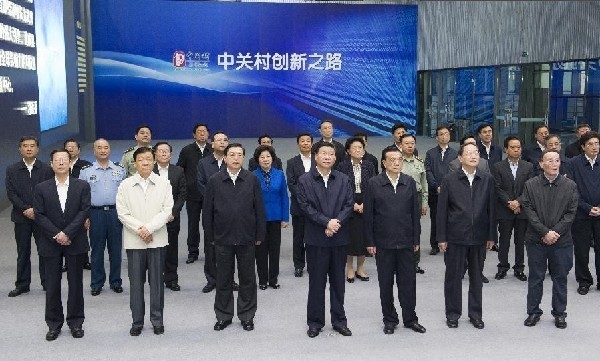 |
|
China's top leaders Xi Jinping (C, front), Li Keqiang (3rd R, front), Zhang Dejiang (3rd L, front), Yu Zhengsheng (2nd R, front), Liu Yunshan (2nd L, front), Wang Qishan (1st R, front), Zhang Gaoli (1st L, front) and other members of the Political Bureau of the Communist Party of China (CPC) Central Committee visit the Zhongguancun Science Park in Beijing, capital of China, Sept. 30, 2013. China's top leadership held a group study Monday in Zhongguancun, a Beijing technology hub known as China's Silicon Valley. (Xinhua/Huang Jingwen) |
China's top leadership held a group study Monday in a Beijing technology hub known as China's Silicon Valley, the first time such a study has been held outside the central authority's seat at Zhongnanhai.
Analysts said the move signaled the Chinese top leadership's determination to keep in close contact with the masses and seek an innovation-driven development pattern.
Members of the Political Bureau of the Communist Party of China (CPC) Central Committee on Monday morning visited the Zhongguancun Science Park, which, after 20 years of development, now boasts about 20,000 hi-tech companies.
Situated in the northwestern part of Beijing, Zhongguancun is known as the technology hub and is often referred to as the Silicon Valley in Beijing.
Led by Xi Jinping, general secretary of the CPC Central Committee, the Political Bureau members viewed world-class innovative products at Zhongguancun.
They talked with executives and scientists about research and implementation of new technologies such as additive manufacturing, cloud computing, nano materials, bio-chips and precise crop breeding.
After Wan Gang, minister of Science and Technology, explained general situation of China's science and technology innovation, the Political Bureau members discussed the innovation-driven development strategy.
Presiding over the group study, Xi stressed importance of science and technology in enhancing national strength, saying that innovation is a global trend and also a need inside the country.
"We must enhance awareness of unexpected challenges and grab the opportunity of the science and technology revolution. We cannot wait, hesitate or slack," Xi said.
China should focus on integration of innovation with economic and social development, enhance capacity for independent innovation, improve talent development, build a favorable policy environment and expand opening-up and international cooperation in science and technology, Xi said.
The group study is a system China's top leadership uses to study major issues. Since 2002, over 100 experts and scholars have delivered lectures in Zhongnanhai, the seat of the top leadership.
It was the ninth group study of the 18th Political Bureau of the CPC Central Committee, and the first time that the top leadership held a group study outside Zhongnanhai.
Prof. Xin Ming at the Party School of the CPC Central Committee said it was a change in learning style.
"Wherever the development priority is, that is where the classroom should be," Xin said.
In its 18th National Congress in November 2012, the CPC put forward a strategy of innovation-driven development, stressing the importance of scientific innovation in improving productivity and overall national strength.
Xi has also stressed the importance of innovation and science since then. When visiting the Chinese Academy of Sciences in July, he called for a strong command of science to help revitalize the country.
From Zhongnanhai to Zhongguancun, the top leadership can learn about the latest in science and technology development and better understand the problems that need to be addressed, Xin said.
"Field study can help make better policies," Xin said.








